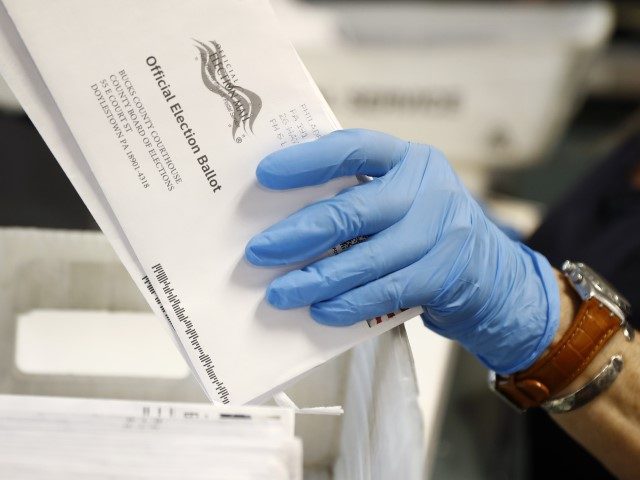The Pennsylvania Supreme Court upheld the state’s law allowing mail-in voting on a strict party-line vote after the lower court ruled in January that it violated the state’s constitution.
The state’s mail-in voting law, Act 77, was upheld on a 5-2 decision released Tuesday from the state’s partisan Supreme Court; only two of the judges are Republican.
Justice Sallie Updyke Mundy began her dissent in the case:
Its most glaring omission is its failure to come to grips with the fact that the Pennsylvania Constitution’s election-related provisions have been amended on numerous occasions in the 160 years since this Court first explained that by default it requires in-person voting, and in none of those instances have the people of this Commonwealth sought to eliminate, alter, or clarify the textual basis for that ruling as it appears in our organic law. The majority also emphasizes the popularity of the legislation under review and the care with which it was debated, going so far as to recite the margin by which it was passed in each House of the General Assembly and the party affiliation of the legislators. None of these observations has any relevance to the issue before this Court. Legislation inconsistent with our state Charter cannot gain validity through popular sentiment or careful drafting. The Constitution stands as a bulwark against contrary sentiment and the passions of the moment, and it can only be altered in the careful manner that it prescribes.
As Mundy also wrote, she has to “respectfully dissent” due to the majority opinion not providing a convincing argument that the state’s charter would permit the use of universal and no-excuse mail-in ballots, especially “in light of its specific authorization for absentee ballots for four defined groups of voters.”
After a lengthy analysis, Mundy concluded:
I express no opinion as to whether no-excuse mail-in voting reflects wise public policy. That is not my function as a member of this state’s Judiciary. My function is to apply the text of the Pennsylvania Constitution, understood in light of its history and judicial precedent. In so doing, I would hold that that venerable document must be amended before any such policy can validly be enacted. Accordingly, I respectfully dissent.
In joining Mundy on the dissenting opinion, Justice Paul Kevin Brobson filed another dissenting opinion stating:
Succinctly stated, the majority overrules 160 years of this Court’s precedent to save a law that is not yet 3 years old. It does so not to right some egregiously wrong decision or to vindicate a fundamental constitutional right.
…
Honoring our precedent and striking Act 772 as unconstitutional would not extinguish the right of people to vote in this Commonwealth; rather, it would merely return us to where we were before the 2020 primary election.
Since this Court decided Chase (3) and reaffirmed Chase’s holding in City of Lancaster (4), it has never been seriously debated that the phrase “offer to vote,” as it has appeared in our Pennsylvania Constitution since 1838, embraces the historical preference in our Commonwealth for in-person voting at a polling place, whether “by ballot or by such other method as may be prescribed by law.”
The state’s law, which is not even three years old, was initially passed with bipartisan support in 2019. It has since become one of the main focuses of the Republican-driven campaign for election integrity into which the RNC, as well as other GOP groups, have invested millions of dollars since 2020.
However, specifically in Pennsylvania, the Republican-driven push for election integrity has been against mail-in voting, as there was controversy following President Donald Trump’s loss in 2020.
Reaction from Republicans and conservatives has been swift and forceful in the wake of Tuesday’s decision.
“Today’s decision is flatly wrong for the reasons the dissenting justices explained,” says Ambassador Ken Blackwell, chairman of the Center for Election Integrity at the America First Policy Institute (AFPI). “Lawmakers realized they made a mistake in voting for this unconstitutional change in 2019, and now election integrity is in the hands of Pennsylvania voters.”
The case is McLinko v. Pennsylvania, No. J-18A-2022, J-18B-2022, J-18C-2022, J-18D-2022, and J-18E-2022 in the Supreme Court of Pennsylvania.
Jacob Bliss is a reporter for Breitbart News. Write to him at jbliss@breitbart.com or follow him on Twitter @JacobMBliss.

COMMENTS
Please let us know if you're having issues with commenting.